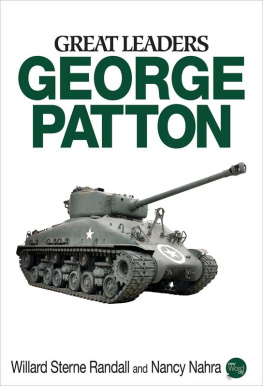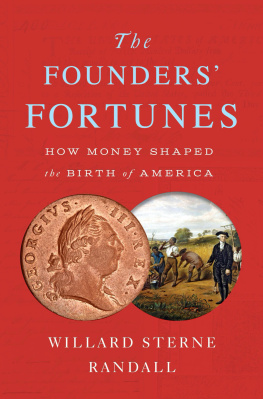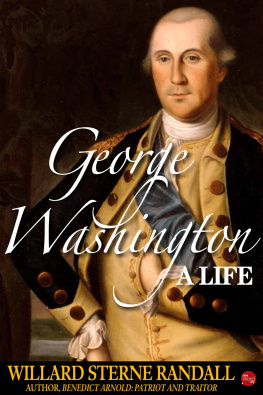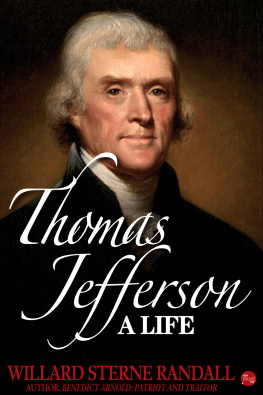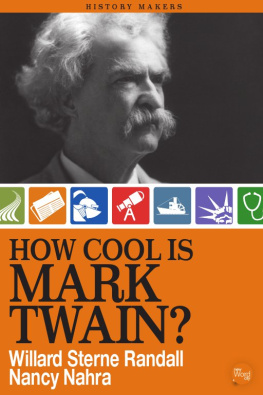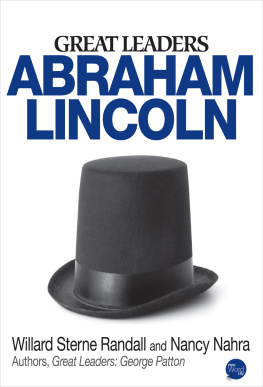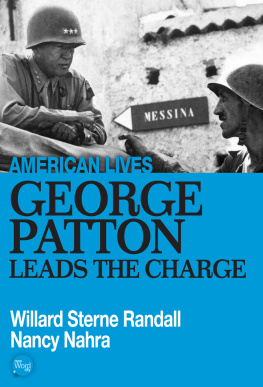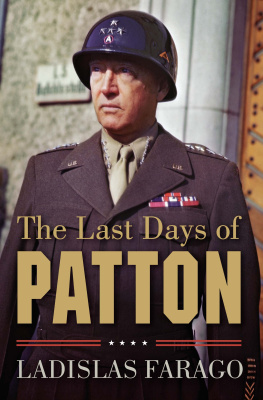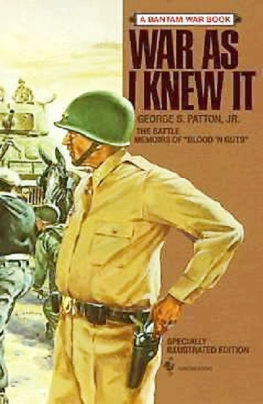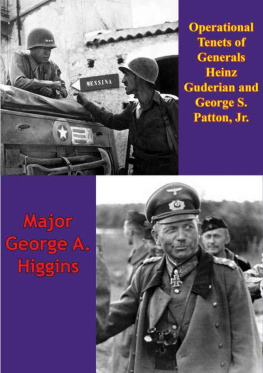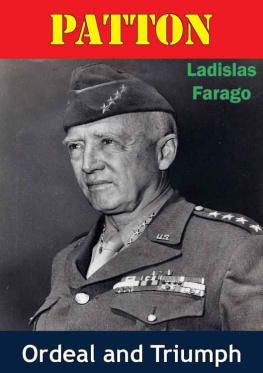Willard Sterne Randall - George Patton
Here you can read online Willard Sterne Randall - George Patton full text of the book (entire story) in english for free. Download pdf and epub, get meaning, cover and reviews about this ebook. year: 2013, publisher: New Word City, genre: History. Description of the work, (preface) as well as reviews are available. Best literature library LitArk.com created for fans of good reading and offers a wide selection of genres:
Romance novel
Science fiction
Adventure
Detective
Science
History
Home and family
Prose
Art
Politics
Computer
Non-fiction
Religion
Business
Children
Humor
Choose a favorite category and find really read worthwhile books. Enjoy immersion in the world of imagination, feel the emotions of the characters or learn something new for yourself, make an fascinating discovery.
- Book:George Patton
- Author:
- Publisher:New Word City
- Genre:
- Year:2013
- Rating:4 / 5
- Favourites:Add to favourites
- Your mark:
- 80
- 1
- 2
- 3
- 4
- 5
George Patton: summary, description and annotation
We offer to read an annotation, description, summary or preface (depends on what the author of the book "George Patton" wrote himself). If you haven't found the necessary information about the book — write in the comments, we will try to find it.
As fearless as he was profane, General George S. Patton was among the most competent and controversial generals ever to serve in the United States military. Under his inspiring leadership, Americas Third Army helped defeat the German forces. In December 1945, only months after the Allied victory in World War II, Patton died in an automobile accident. Who was George Patton and what can leaders on all fronts learn from him? Youll find the answers here in this short-form book.
Willard Sterne Randall: author's other books
Who wrote George Patton? Find out the surname, the name of the author of the book and a list of all author's works by series.
George Patton — read online for free the complete book (whole text) full work
Below is the text of the book, divided by pages. System saving the place of the last page read, allows you to conveniently read the book "George Patton" online for free, without having to search again every time where you left off. Put a bookmark, and you can go to the page where you finished reading at any time.
Font size:
Interval:
Bookmark:
George Smith Patton, Jr., had few doubts, especially about himself. From his boyhood, he never doubted for a moment that he would be a soldier and a leader like so many of his ancestors, and that he would someday be a general and a hero. He never doubted that he would have the opportunities to accomplish whatever he wanted and to have enough money or know the right people, who would, of course, want to advance his interests and reward him. The only doubts he ever harbored were mostly about his own physical courage, which he confided only to a few family members. Certainly, no one else ever questioned his courage, which, from early childhood, he was certain should always be demonstrated as ostentatiously as possible.
Pattons confidence came from a family he was only half proud of - his fathers half. George Smith Patton II, a lawyer when George Jr. was born on November 11, 1885, was the elected district attorney of Los Angeles County. He later became the wealthy owner of thousands of acres of Southern California vineyards and farmlands. With Henry E. Huntington, he was the principal developer of Pasadena and San Gabriel and was the first mayor of San Marino.
But more important to young George was his fathers Virginia ancestry. His first American forefather, Robert Patton, emigrated from Scotland on the eve of the American Revolution and married the daughter of General Hugh Mercer, who was bayoneted to death at the Battle of Princeton in 1776. Mercer, a close friend of George Washington, was George Pattons first hero. Robert Pattons son, Robert, Jr., and his wife Margaret had twelve children, including seven sons, all of whom fought as officers in the Confederate Army in the Civil War. The three studied warfare under Professor Thomas J. Stonewall Jackson at the Virginia Military Institute (VMI). One of Georges uncles died at Gettysburg in General George Picketts charge, and seven Patton first cousins were Confederate officers.
Georges favorite family hero was his grandfather, the first George Smith Patton, who practiced law in what is now Charleston, West Virginia, and had been an acting governor of Virginia. He helped organize the Kanawha Rifles, the militia that helped put down John Browns slave insurrection at Harpers Ferry. These West Virginians became Company H, 22nd Virginia Infantry, under Colonel Patton. Raiding Washington, D.C., with Jubal Earlys corps, they nearly captured President Abraham Lincoln, who had never seen any of the fighting and was peering over the walls of Fort Stevens when a young Captain Oliver Wendell Holmes yelled for Lincoln to get down and took a bullet aimed at the president, saving his life. In the Third Battle of Winchester in the final Shenandoah Valley campaign, Colonel Patton was killed leading his troops on September 19, 1864. He was thirty-one years old.
Any chance of being born a Virginian was lost to George, Jr., when his widowed grandmother left the war-torn Old Dominion forever and traveled to Los Angeles, where her brother was an attorney. Margaret Patton taught school and scraped by until she married her husbands cousin, also a VMI graduate and Confederate colonel in the war. Little Georgie Patton loved to hear stories of his grandfathers Civil War exploits. Men of my blood he later wrote, have ever inspired me. Should I falter, I will have disgraced my blood.
George Patton suffered from dyslexia and was nearly twelve when he started school. His father read aloud to him and trained his memory. The books he loved to hear included Sir Walter Scotts romantic tales, those chivalric epics of Scottish lore, along with Homers Iliad and Odyssey, Xenophons adventures, and Shakespeares tragedies, with a light dash of Rudyard Kipling. Georges father was a mystic who believed in prophecies as well as in a self-righteous, Old Testament God. Young Patton struggled with his dyslexia, but it also honed his drive and created in him a lifelong yearning to learn. Not surprisingly, military history was his favorite subject.
One month before his twelfth birthday, George enrolled in Cutter Clarks School for Boys in Pasadena, where he enjoyed studying the lives of the military heroes of ancient Greece and Rome, as well as Joan of Arc and Napoleon. At home, he reveled in visits from a neighbor, Colonel John Singleton Mosby, the famous cut-and-thrust Confederate raider who had become a lawyer for the Southern Pacific Railroad. Other former Confederates also came to call, thrilling young George whenever the talk turned to Robert E. Lee. Outdoors much of the time, Patton became an expert rider, hunter, sailor, and fisherman, catching enormous sea bass and marlin off Catalina Island, where his parents had a cottage.
After six years at Clarks school, where he never learned to spell, he followed family tradition and enrolled at VMI. That summer, he met Beatrice Ayer, two years younger but already a fearless sailor. She was the daughter of the wealthy Boston textile manufacturer, Frederick Ayer.
Six-feet tall and handsome, Patton was a model cadet at VMI, although his dyslexia hampered his studies. He struggled to decipher every word. He was accepted to West Point in 1904 after a year at VMI. He again ran into difficulties, this time flunking mathematics and receiving poor marks in French, forcing him to repeat his plebe year. He was only a little more successful in sports. He played so recklessly in football practices that he injured his arm and failed to make the team. He then went out for track and earned a letter as a high hurdler. In his second or yearling year as a cadet officer, he gave out so many demerits to incoming plebes that he became unpopular and was demoted from second to sixth corporal. Haunted by the fear that he was a coward, he joined the fencing team and became an impressive broadswords man. He also earned a reputation as a daring horseback rider. In his last year, after climbing back up through the ranks of class officers, he achieved the honor of appointment as adjutant of the corps of cadets - the leader of his class.
Throughout his years at West Point, Patton was Bea Ayers constant escort. When she asked him why he sought a soldiers hard life, he explained that he felt the pull of tradition, loved excitement, and wanted to make a reputation for himself: If you take away these three things, what is left in life? Taking five years to complete West Point, Patton graduated in 1909 and stood forty-sixth out of a class of one hundred and three. He chose to be commissioned a second lieutenant in the cavalry. One year later, he married Bea. They would have three children.
Posted first to Fort Sheridan near Chicago, he devoted his ample leisure time to riding to the hounds, laying out a polo field, and coaching a football team. He began a self-study course in military tactics. His commanding officer rated him the most enthusiastic soldier of my acquaintance [who] misses no chance to improve. Deciding he needed a more fearsome facial expression, Lieutenant Patton stood for hours before a mirror trying to transform his boyish appearance into the sullen glower of a man of war. And he believed in spit and polish. When he and Bea settled into a tiny house on the base, he insisted they dress for dinner. The poorer the surroundings, he said, the more important it is to keep up your standards.
At Fort Sheridan, Patton also learned the art of pulling strings. His commander, his father, and his father-in-law all used their connections to find him a post at Fort Myer, Virginia, where the Army chief of staff was stationed and where a gentleman could attract attention for his horsemanship in polo matches and military funeral processions.
Patton arrived at Fort Myer in 1911. Within a year, he won a place on the U.S Olympic team. In the Stockholm Olympics, where a Native American, Jim Thorpe, won three gold medals, Patton scored fifth in the pentathlon, a competition consisting of steeplechase riding, shooting, fencing, swimming, and a 5,000-meter race. He missed his target twice when firing his pistol from horseback, but he was the only fencer to beat the French champion. Back in Washington, D.C., he continued to make a name for himself in steeplechase races, explaining to his father-in-law: What I am doing looks like play to you, but in my business it is the best sort of advertising. It makes people talk, and that is a sign they are noticing.... The notice of others has been the start of many successful men.
Next pageFont size:
Interval:
Bookmark:
Similar books «George Patton»
Look at similar books to George Patton. We have selected literature similar in name and meaning in the hope of providing readers with more options to find new, interesting, not yet read works.
Discussion, reviews of the book George Patton and just readers' own opinions. Leave your comments, write what you think about the work, its meaning or the main characters. Specify what exactly you liked and what you didn't like, and why you think so.

